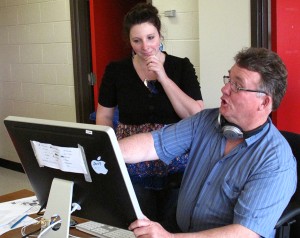 [1]
[1](Belleville, Ont. 05/18/11) QNet Newsroom editor Mike Beaudin explains a new concept to Ashleigh Gehl during a work session in the newsroom at Loyalist College. Gehl is part of the Journalism Online Print Broadcast program at Loyalist. Photo by Jennifer Bowman
By Jennifer Bowman
Students will soon be able to go to Loyalist College and Trent University at the same time – and for less money.
Loyalist College in Belleville and Trent University in Peterborough recently signed a letter of intent, which means they will work together to find more opportunities for students to get a college and university education at the same time. This would include joint programs between Loyalist and Trent.
“It gives them an extra year or two at home, for example, and then when they go to university, they’re not starting from scratch,” said John McMahon, vice president academic at Loyalist College. “They’re obtaining a significant amount of credit for those two years, if not the entire two years. That’s really our ultimate objective.”
Loyalist and Trent are focusing their efforts on journalism, biosciences, and general arts and sciences. Right now, they’re starting by working toward a combined journalism program.
Students in the joint journalism program will spend two years at Trent, and two months of the summer at Loyalist. The remaining two years will be spent with the existing Journalism Online Print Broadcast students in the QNet newsroom. That will be the capstone year where students will also use the research they are doing for their degree at Trent in the newsroom at Loyalist.
The program offers students a really solid theoretical base in critical thinking and research skills, said Jane Harrison dean of media studies at Loyalist College. Then provides an opportunity for them to gain hands-on skills, tying everything they’ve learned together in a meaningful way.
Students graduating from the program will have a joint degree advanced diploma. Joe Callahan, a journalism professor at Loyalist College, sees this as an open door to job opportunities.
“As employers, to see somebody who has both, I think it’s a magic, magic combination,” said Callahan.
There is the potential it could become competition on the job market for the already existing journalism program at Loyalist College, but Harrison isn’t concerned.
“It always comes down to the person and the interview,” said Harrison. “Our credential is already recognized. I suspect that some places will look at this as an advantage because you have the theoretical base and the practical, but it’s already recognized, so it’s not like people won’t get an interview, but then it’s up the them to shine.”
With less time spent undertaking an education, it also becomes less expensive.
Tuition fees haven’t been determined but will be similar to university tuition, said Karen Maki, director, post-secondary partnerships & distance education, Trent University. That will save students a lot of money compared to what doing consecutive college and university programs would cost, she said.
The project has been on the table for more than a decade, being shuffled as people come and go.
“It’s the right people in the right place at the right time,” said Maki.
Callahan was one of the instigators in the late 90’s.
The big questions when they looked at the possibility of a joint journalism program was how they could best serve the students, community and the journalism industry, said Callahan.
Part of what helped the joint agreement finally fall into place was the ministry of colleges and universities.
“They are very supportive and strongly encourage colleges and universities to increase the level of energy they’re applying to exploring these opportunities for students,” said McMahon.
In the end, the focus is on the students. For Trent, it’s filling a gap potential students have been asking about, the lack of a journalism program at the university.
“It allows us to attract students who are interested in journalism and haven’t been able to pursue that before,” said Maki. “We know that it’s something that students are looking for. So combining the best of Loyalist and the best of Trent, we really feel that we’ve got a great new credential to be offering students, and I think we’ll in the end be benefitting both Trent and Loyalist.”
For those attending Loyalist, there won’t be any visible change, at least not yet.
There may be some Trent classes at Loyalist in the future.
“Our approach is to start with a few programs,” said McMahon, “to develop the expertise and to develop some success stories, but really, the objective is to use that model and apply it across the board.”
The journalism program is tentatively scheduled to start in the fall of 2012.